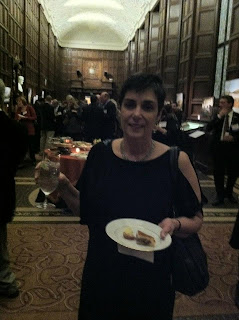The Chronicle of Higher Education writes: "The honor is the nation's most prestigious teaching award, with national winners chosen from four types of institutions: a community college, a baccalaureate college, a master's institution, and a doctoral, research university."
On Thursday, Nov. 15, 2012 I, along with three other national winners, gave an acceptance speech at the beautiful and iconic National Press Club. I spoke to an audience of about 250 persons which consisted of state winners, educators from across the nation, college and university presidents, journalists and Martha J. Kanter, Under Secretary of Education.
http://www.usprofessorsoftheyear.org/Winners.html
Below is the text of my acceptance speech.
Lois Roma-Deeley - Acceptance Speech
2012 Outstanding Community Colleges Professor of the YearLois Roma-Deeley
Professor of Creative Writing
Paradise Valley Community College
Click on the video to hear the speech. The text is below.
My thanks to the Carnegie Foundation for the Advancement of Teaching, CASE and to all who have made this day possible. I am deeply honored to receive this award.
Some say we live in a cynical age where the idea of "noble lives," of striving, failing and then trying again, are antiquated notions—relics from another age.
But I know better. My students have taught me well.
Our campus is an educational institution for "all seasons." At my college, the notion of a liberal arts education as a transformative experience is put into practice every day—where Shakespeare has meaning and purpose as much in the life of a nursing student as it does for a retired accountant; where the study and practice of poetry can reshape the lives of future firefighters and former business owners; and where the love of learning is in itself a value because it leads us to the very center of our own humanness.
Every day, I am witness to the countless efforts of students who refuse to give up. I see, in very real and concrete ways, those who believe—even if they don't yet fully understand—the power of the educational experience to transform their lives. My students know their liberal arts education will, ultimately, ask them to answer one simple question. And that question is not: What will you do with your life? Rather: How will you live your life?
The community college in America is one of our nation's best-known institutions and best-kept secrets. While it's true that some of my community college students come to our campus for workforce training, many also come for a quality liberal arts education. In my creative writing classrooms, my students—the future dietitians, computer programmers, musicians, teachers, lab techs, pharmacists and the like—sit alongside retired doctors, lawyers and accountants.
It would not be unusual to see how the 42-year-old roofer, the 25-year-old Serbian immigrant and the 16-year-old home-schooled Eagle Scout find they have more in common than anyone would ever suspect or how the former gang member and the current real estate agent form bonds that are as deep as they are extraordinary. My students know that a community college classroom is a place where the privilege of a quality education is not the exclusive purview of the privileged few.
We learn from each other. And if I am a good teacher, it is because I had good teachers. For example, my older brother, Nick Faraone, was the first in our family to finish high school and then college. He later taught high school for 33 years. But, as a young, first-year college student, he would sit me down at our kitchen table and teach philosophy, poetry, politics to me—a 12-year-old girl. What he taught me is this: nothing worth having is easy, that the riches of an intellectual life are mine for the taking and that, with patience and fortitude, nothing is beyond my capacity to learn.
The community college is one of our most democratic institutions. You can come to us for first, second and third chances, and how yes, we offer workforce development but also we offer our students a chance to become part of a vibrant liberal arts community with dedicated teachers who are also working artists and highly regarded professionals in their chosen disciplines.
All we ask is that the students come to us. And work hard. And dream big.

.jpg)


